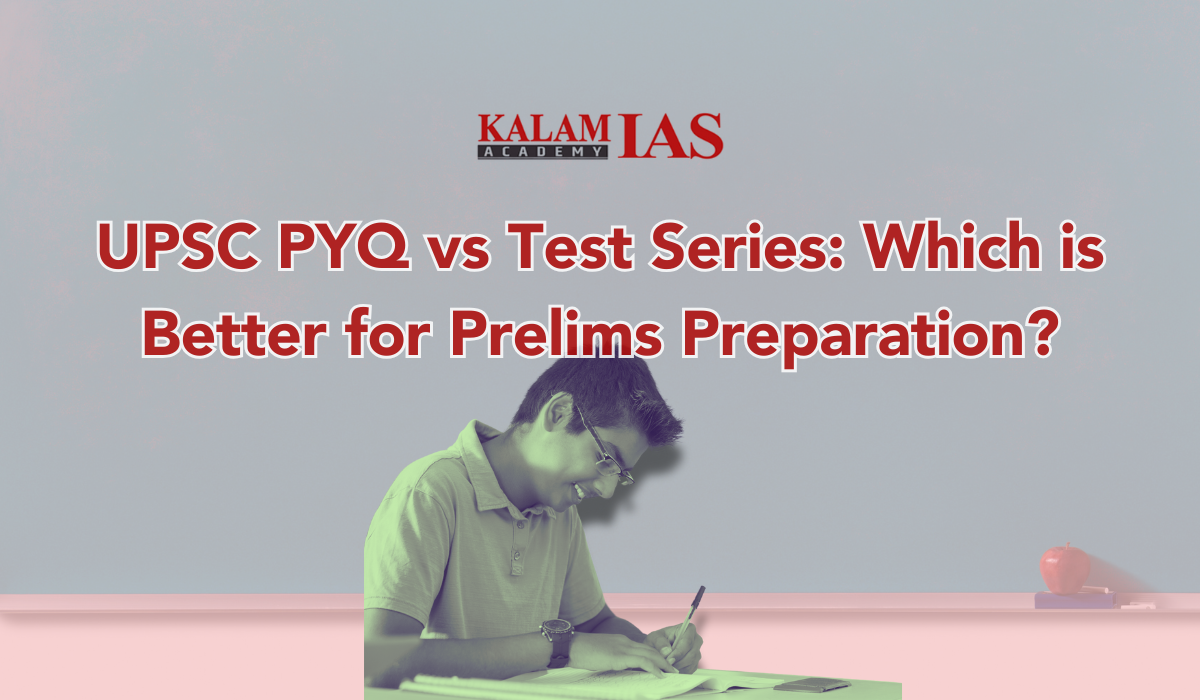
Kalam IAS Academy was founded by a team of committed individuals who believe that the traditional way of UPSC preparation needs to be changed.
Official Info:

UPSC PYQ vs Test Series: Which is Better for Prelims Preparation?
Preparing for the UPSC Civil Services Exam is not just about hard work, but also about choosing the right tools for practice. One of the most common debates among aspirants is whether to rely on UPSC PYQs (Previous Year Questions) or focus more on test series. Both have their own importance, but understanding how they work can help you make the best use of them for Prelims success.
Why UPSC PYQs are Important
UPSC PYQs are the most authentic resource for any aspirant. They show the exact style, depth, and structure of questions that the Commission asks. By analyzing PYQs, you can see:
Which subjects or themes UPSC repeatedly emphasizes
How the difficulty level has evolved over the years
The balance between static and current affairs-based questions
Studying PYQs helps you think like UPSC and prepares you for the kind of surprises that often appear in the exam.
Strengths and Limitations of UPSC PYQs
Strengths of UPSC PYQs:
Direct insight into exam trends and priorities
Helps identify important topics across subjects
Builds confidence by practicing real questions
Limitations of UPSC PYQs:
The pool is limited (you can only practice what has been asked before)
May not cover new or emerging areas in the syllabus
Cannot replace full-length timed practice
While PYQs are a foundation, they need to be supplemented with other tools.
Why UPSC Test Series are Essential
Test series serve a different purpose. They are designed to simulate the real exam environment, allowing you to practice under time constraints and exam pressure. They also help with:
Covering the entire UPSC syllabus, including areas not asked in PYQs
Practicing new and unexpected question formats
Improving time management and accuracy
Getting detailed feedback to correct mistakes
Aspirants who take test series seriously often find themselves more disciplined and exam-ready.
Strengths and Limitations of UPSC Test Series
Strengths of UPSC Test Series:
Provide wider syllabus coverage
Improve exam temperament and stamina
Offer explanations and analysis to strengthen weak areas
Limitations of UPSC Test Series:
Sometimes questions don’t match UPSC’s style
Risk of over-reliance — solving too many mocks without revising basics
Quality varies across institutes
A test series should complement your preparation, not become the sole focus.
UPSC PYQ vs Test Series – The Right Balance
The truth is that this is not an either-or choice. UPSC PYQs and test series must go hand in hand.
A practical sequence would be:
Start with PYQs to understand the exam’s demand
Revise and strengthen your knowledge based on PYQ trends
Take test series to practice application under timed conditions
Revisit PYQs to ensure you are aligned with UPSC’s pattern
This balanced approach ensures that your preparation is both authentic and comprehensive.
Structured Guidance Through UPSC Prelims PYQ Mentorship
Learn the smartest way to analyze and practice UPSC Prelims PYQ through the Pratibimb UPSC PYQ Mentorship Program at Kalam IAS
Why UPSC Prelims PYQs Must Be Part of Your Strategy
When it comes to UPSC PYQ vs Test Series, the debate is not about which is better, but about how to use both together. PYQs help you understand UPSC’s mindset, while test series prepare you to face the exam confidently. Combining the two — with proper mentorship — gives you the strongest chance of success in the Prelims.
If you’re serious about cracking the UPSC exam, consider a structured plan that uses both tools wisely. Applying both effectively can bring you a significant step closer to clearing Prelims.
UPSC Prelims PYQ – FAQs
Q1. How should I use UPSC PYQs for Prelims prep?
Start by solving year-wise PYQs to understand question style and recurring topics. Note the themes that repeat, revise those subjects, and then re-attempt PYQs as self-tests.
Q2. How many years of PYQs should I solve?
Focus on at least the last 10 years in detail. For trend spotting, you can look at 15–20 years, but for in-depth practice the recent 8–10 years matter most.
Q3. When should I use PYQs versus mock tests?
Begin with PYQs to understand UPSC’s language and priorities. Once you’re comfortable, shift to test series for speed and exam temperament. In the final months, cycle back to PYQs for focused revision.
Q4. How often should I re-attempt PYQs?
After covering a good number of PYQs, keep revisiting the topics where you made mistakes or felt unsure every 2–3 weeks. In the weeks before Prelims, re-attempt a selected set of important PYQs in exam conditions for final practice.
Q5. Should I only solve PYQs from Books or PDFs, or in exam-like conditions?
Do both. First solve them untimed to understand logic, then re-solve a curated set in exam-like timed conditions to practice accuracy and speed.
Q6. Can PYQs replace test series?
No. PYQs align you with UPSC’s mindset, but test series build exam stamina, time management, and coverage of new areas. Both are needed.
Q7. How can I record learnings from PYQs effectively?
Maintain a short notebook or spreadsheet where you note the question, correct answer logic, source, and recurring tags. This makes revision faster and topic-wise.
Q8. Where can I get structured help to use PYQs effectively?
Guided mentorship shows you how to prioritise, analyse, and integrate PYQs into your preparation. Explore the UPSC PYQ Mentorship Program at Kalam IAS.
